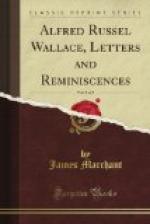“On one occasion, when I was asked by Mrs. Wallace to see Dr. Wallace professionally, he was lying on the sofa in his study by the fire wrapped up in rugs, having just got over a bad shivering attack or rigor. His temperature was 104 deg. Fahr., and all the other usual signs of acute fever were present, but nothing to enable one to form a positive opinion as to the cause. It must have been forty years since he had been in the tropics, but I think he felt that it was an attack of malarial fever. Knowing my patient, my treatment consisted in asking what he was going to do for himself. ‘Well,’ he said, ’I am going to have a hot bath and then go to bed, and to-morrow I shall get up and go into the garden as usual.’ And he was out in the garden next day when I went to see him. This was an instance, doubtless one of many, of the ‘will to live,’ which carried him through a long life.
“Once, when he was talking about the gaps in the evolution of life, viz. between the inorganic and organic, between vegetable and animal, and between animal and man, I asked, ’Why postulate a beginning at all? We are satisfied with illimitability at one end, why not at the other?’ ‘For the simple reason,’ he said, ’that the mind cannot comprehend anything that has never had a beginning.’
“What attracted me to him most, I think, was his remarkable simplicity of language, whatever the topic of conversation might be, and this not the simplicity of the great mind bringing itself down to the level of the ordinary individual, but his customary mode of expression. I have heard him say that he felt the need of the fluency of speech which Huxley possessed, as he had to cast about for the expression that he wanted. This may have been the case when he was lecturing, but I certainly never noticed it in conversation.”—H.E.L.
* * * * *
Dr. Wallace was always interested in young men and others who were going abroad with the intention of studying Natural History, and gave them what advice and help he could. He much enjoyed listening to the accounts given by travellers of the scenes, animals and plants and native life they had seen, and deplored the so-called civilising of the natives, which, in his opinion, generally meant their exploitation by Europeans, leading to their deterioration and extermination.
His nervousness with strangers sometimes led them to form quite erroneous impressions. It occasionally found expression in a nervous laugh which had nothing to do with amusement or humour, but was often heard when he was most serious and felt most deeply. One or two interviewers described it as a “chuckle,” an expression which suggested feelings most opposite to those which he really experienced.
Although he could draw and sketch well, he did not take much pleasure in it, and only exercised his skill when there was a definite object in view. His sketches show a very delicate touch, and denote painstaking accuracy, while some are quite artistic. He much preferred drawing with compasses and squares, there being a practical object in his mind for which the plans or drawings were only the first steps. Even in his ninety-first year he found much enjoyment in drawing plans, and spent many hours in designing alterations to a small cottage which his daughter had bought.




